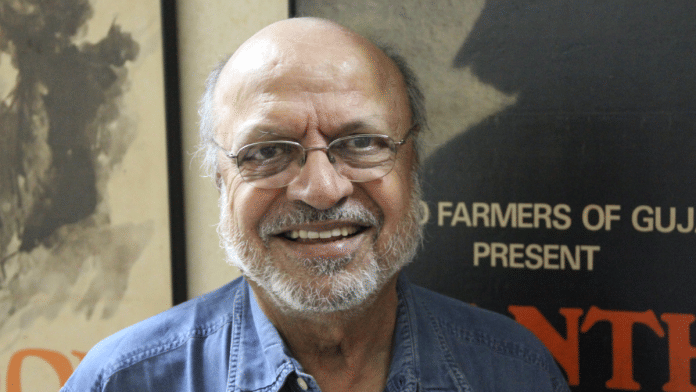New Delhi: Filmmaker Shyam Benegal, who was suffering from a chronic kidney-related disease, passed away at the age of 90 in Mumbai Monday. Known for having spearheaded the parallel cinema movement in the 1970s and 1980s, his zeal was intact right up till the end. “I’m working on two to three projects; they are all different from one another. It’s difficult to say which one I will make. They are all for the big screen,” the director had told PTI in an interview earlier this month, as he turned 90. His last film was Mujib: The Making of a Nation (2023), a biopic of Sheikh Mujibur Rahman, the founding father of Bangladesh.
Just a week ago, on 15 December, actor Shabana Azmi—with whom Benegal had worked frequently, in films like Ankur (1974), Nishant (1975), and Mandi (1983)—had shared a picture from his 90th birthday celebrations.
A former faculty member and two-time chairman of the Film and Television Institute of India, Benegal’s filmmaking contrasted sharply with mainstream ‘masala’ movies.
A case in point is Manthan (1976), one of his creative best, which was restored by the Film Heritage Foundation and screened at Cannes this year. The film was commissioned by the National Dairy Development Board in Gujarat, founded by Verghese Kurien in 1965, and was funded by Gujarat’s milk farmers.
“Dr Kurien suggested that he would make half the million milk farmers of Gujarat give two rupees each for this film. That’s how Manthan started. We chose Girish Karnad to play Dr Kurien. We got Vijay Tendulkar to write the script. He met Dr Kurien and came up with several ideas. We chose one that became Manthan. The script won the National Award. Then I made the film,” Benegal had said in an interview with The Times of India 2012.
As Avijit Ghosh recounts his book When Ardh Satya Met Himmatwala, Benegal was also among the filmmakers—others included Basu Chatterjee and Ketan Mehta—who ventured into TV serials in the 1980s, as the middle-class audience started shifting to the small screen.
His television oeuvre includes Yatra (1986) for the Indian Railways, and the 53-episode television serial Bharat Ek Khoj (1988) based on Jawaharlal Nehru’s The Discovery of India.
Benegal received 18 national awards for his films, and was also honored by the Government of India with the Padma Shri in 1976 and the Padma Bhushan in 1991.
‘Changed direction of cinema, upheld secular values’
Tributes poured in for Benegal as news of his death spread.
“He created ‘the new wave’ cinema.#shyambenegal will always be remembered as the man that changed the direction of Indian Cinema with films like Ankur, Manthan and countless others….Farewell my friend and guide,” wrote Shekhar Kapur.
He created ‘the new wave’ cinema. #shyambenegal will always be remembered as the man that changed the direction of Indian Cinema with films like Ankur, Manthan and countless others. He created stars out great actors like Shabama Azmi and Smita Patil. Farewell my friend and guide pic.twitter.com/5r3rkX48Vx
— Shekhar Kapur (@shekharkapur) December 23, 2024
Manoj Bajpayee, who acted in Benegal’s Zubeidaa (2001), along with Karisma Kapoor and Rekha, shared a picture from the set of the film. “I’ll forever be grateful for the lessons I learned under his direction. It was an absolute honour to have had the opportunity to work with him,” wrote the actor.
A heartbreaking loss for Indian cinema. Shyam Benegal wasn’t just a legend, he was a visionary who redefined storytelling and inspired generations. Working with him in Zubeidaa was a transformative experience for me, exposing me to his unique style of storytelling & nuanced… pic.twitter.com/EH0eosqkAR
— manoj bajpayee (@BajpayeeManoj) December 23, 2024
Personalities across various fields have paid tribute. Leader of the Opposition Rahul Gandhi wrote, “His legacy in cinema and commitment to social issues will inspire generations. Heartfelt condolences to his loved ones and admirers worldwide.”
Saddened by the passing of Shyam Benegal ji, a visionary filmmaker who brought India’s stories to life with depth and sensitivity.
His legacy in cinema and commitment to social issues will inspire generations. Heartfelt condolences to his loved ones and admirers worldwide. pic.twitter.com/J6ARdNiVNV
— Rahul Gandhi (@RahulGandhi) December 23, 2024
Congress leader Shashi Tharoor shared a nostalgic tweet.
“My sisters and I knew him since our childhood, when he was an advertising professional who photographed them as the first ‘Amul Babies’. His impact will endure, but his passing is an immense loss, for cinema and for humanity,” he wrote.
Mourning the passing of #ShyamBenegal, a giant of India’s New Wave cinema who leaves a considerable body of cinematic accomplishment behind. My sisters and i knew him since our childhood, when he was an advertising professional who photographed them as the first “Amul Babies”.… pic.twitter.com/oKw8iIpJee
— Shashi Tharoor (@ShashiTharoor) December 23, 2024
Doordarshan, for which he made TV serials including Yatra and Bharat Ek Khoj, shared two black-and-white images of the director, along with a tribute.
Shyam Benegal, a giant of Indian cinema, passes away at 90
Filmmaker #ShyamBenegal passed away due to kidney-related ailments in Mumbai.
As a filmmaker, Benegal is renowned for hard-hitting films like Ankur, Nishant, Mandi, Manthan, and Zubeidaa that deal with issues of… pic.twitter.com/wgbEijQT1t
— DD News (@DDNewslive) December 23, 2024
The Communist Party of India (Marxist)’s official handle acknowledged his contribution to cinema and his portrayal of social relations, saying he was “unflinching in his commitment to secular values and in the fight against injustice”.
We pay deep homage to #ShyamBenegal – an outstanding filmmaker, who inspired generations with his courageous portrayal of social realities. He was unflinching in his commitment to secular values and in the fight against injustice. He was always humane and extremely modest,… pic.twitter.com/VASn25gi6t
— CPI (M) (@cpimspeak) December 23, 2024
Cartoonist Satish Acharya turned to art to bid farewell to the filmmaker.
Legendary filmmaker Shyam Benegal passes away at 90. #ShyamBenegal pic.twitter.com/uJIiWf0uTW
— Satish Acharya (@satishacharya) December 23, 2024
Also read: Disturbing, unsettling, but necessary—Shyam Benegal’s Nishant could easily be a 2024 story






